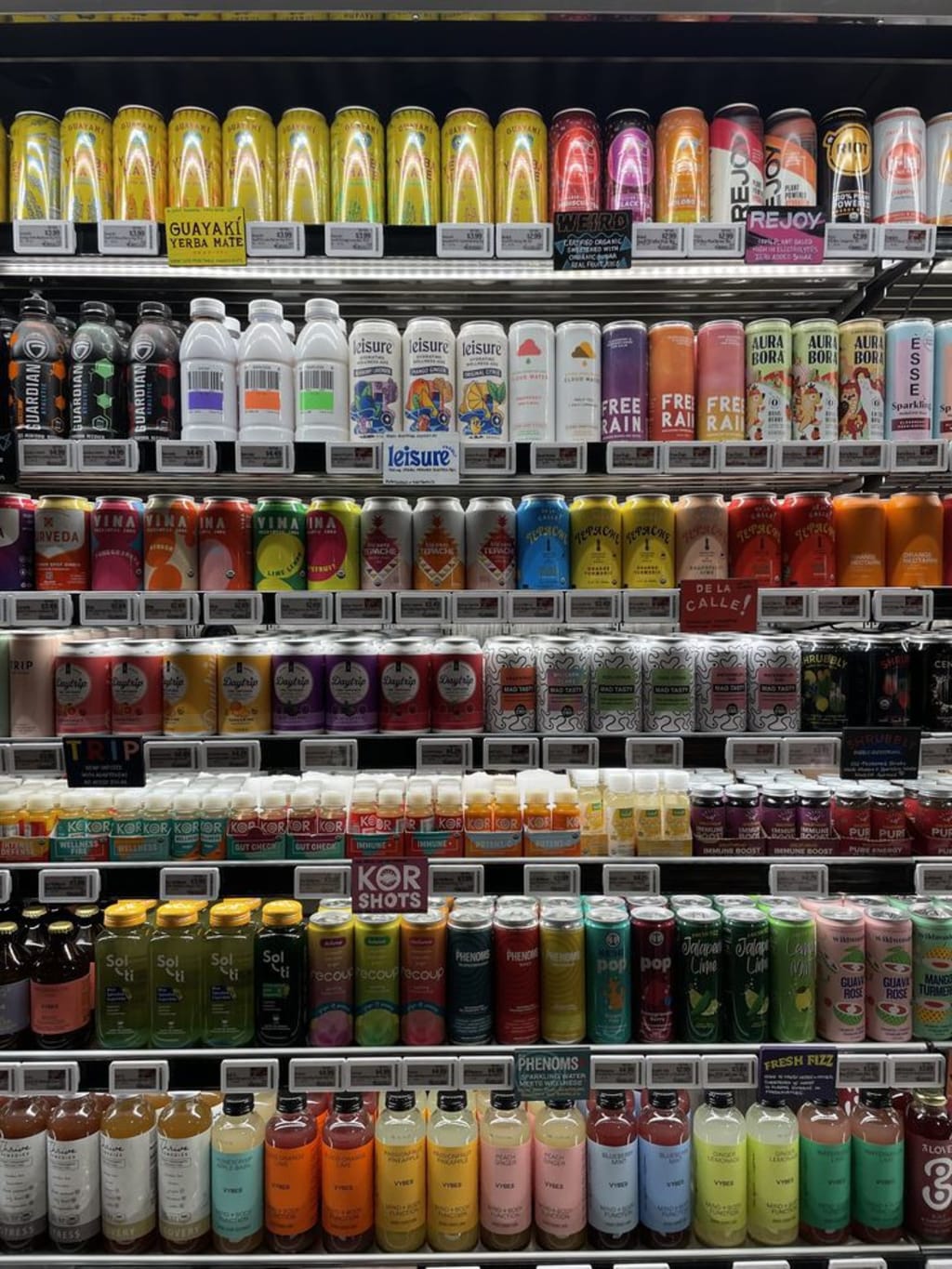Are "healthy" drinks actually beneficial to your health
Let's dive into the claim of "healthy" drink producers

The US healthy drinks market has experienced a remarkable surge, swelling to a staggering $9.2 billion, equivalent to 10% of the entire drinks industry. This impressive growth represents a 50% increase since the COVID-19 pandemic began, reflecting a shift in consumer priorities towards healthier choices. As health consciousness continues to rise, these drinks gain popularity, but questions arise: do they genuinely deliver on their health promises, and are they worth the premium price tag?
The concept of functional drinks is evolving beyond traditional stimulants like coffee, energy drinks, and alcohol, which provide a temporary buzz or energy boost. Now, a new wave of functional drinks is emerging, marketed as healthier alternatives that promise to not only quench thirst but also provide specific benefits, such as improved gut health, immunity, or mental clarity. These drinks often feature ingredients like probiotics, adaptogens, and antioxidants, appealing to consumers seeking a more holistic approach to their beverage choices.
The term "functional drinks" has become synonymous with healthy drinks, boasting ingredients like probiotics for gut health, adaptogens for calmness, nootropics for brain well-being, and CBD for relaxation. While functional drinks have been consumed for centuries, with tea and coffee being prime examples, the modern industry began to take shape in the 1980s with the rise of Red Bull, a pioneer in the energy drink market. Since then, the industry has expanded exponentially, driven by consumer demand for beverages that not only taste good but also provide specific health benefits.
Dietrich Mateschitz, an Austrian entrepreneur, discovered a popular energy drink in Thailand in 1982 and envisioned its potential among European consumers. He adapted the recipe, creating Red Bull, which became a massive success. Red Bull's clever marketing positioned it as a energizing complement to a fast-paced lifestyle, claiming to enhance endurance, reaction speed, and concentration. Although the evidence for these claims was lacking, Red Bull became the pioneer of functional drinks, containing caffeine, sugar substitutes, B vitamins, and taurine. Forty years later, the demand for functional drinks persists, but consumer preferences have shifted towards healthier, more natural ingredients and proven benefits, driving the industry's evolution.
The growing awareness of the harmful effects of ultra-processed foods and environmental pollution has sparked a desire for healthier alternatives. Consumers are seeking simple switches to improve their well-being, driving the rapid growth of the functional beverage industry. Brands are responding by creating drinks that not only avoid harmful ingredients but also offer potential health benefits, such as gut health support and mental well-being enhancement. The gut-brain connection has become a key focus, with the idea that nourishing gut health can have a positive impact on overall well-being. This trend has led to a surge in innovative drinks that promise to support holistic health and happiness.
The involvement of celebrities in the functional drinks industry is a clear indicator of its popularity and potential for growth. Many celebrities, such as Logan Paul, Dwayne "The Rock" Johnson, Katy Perry, and Bella Hadid, are launching their own functional drinks lines, capitalizing on the trend. However, despite the hype, there is limited scientific evidence to support the effectiveness of these drinks in delivering their promised benefits. Moreover, celebrities are also endorsing kombucha, a probiotic drink, which has gained widespread attention, but its health benefits are also not extensively scientifically proven. This phenomenon highlights the power of influencer marketing and consumer desire for healthy beverages, but also raises questions about the regulation and substantiation of health claims in the industry.
The probiotic drinks industry is experiencing remarkable growth, projected to surge from $40 billion to $99 billion by 2033. This sector comprises two main types of drinks: prebiotic sodas, which prepare the gut to absorb nutrients, and probiotic drinks, which introduce healthy bacteria to enhance well-being. While these drinks aim to support gut health, their efficacy is difficult to determine due to the lack of FDA regulation and scientific oversight. Despite making bold health claims, these drinks operate outside a rigorous scientific framework, raising concerns about their actual benefits and potential risks. This highlights the need for more research and regulatory scrutiny to ensure consumer safety and informed decision-making.
The packaging of these functional drinks is indeed a significant factor, appealing to consumers' desire for trendy ingredients like probiotics, nootropics, adaptogens, and CBD. However, the lack of scientific requirements and labeling transparency raises concerns. Brands don't need to disclose specific strains, concentrations, or detailed information, making it difficult for consumers to make informed decisions. Moreover, the science behind gut health and its connection to overall well-being is still in its early stages, and the effects of these ingredients are not yet fully understood. Despite this, these drinks are making bold claims and commanding premium prices, three times that of soda, without conclusive evidence to support their benefits. This highlights the need for more research, regulation, and transparency in the industry.
When navigating the supermarket aisle, here's a smart approach to choosing functional drinks:
1. Check the label: Be wary of vague claims like "supports skin elasticity" or "enhances brain health." These phrases lack concrete meaning.
2. Look for specificity: Opt for drinks that explicitly name the probiotic or ingredient, rather than just listing "probiotics." Research the specific probiotic to understand its benefits.
3. Be mindful of sugar content: Ensure the drink is low in sugar, as many functional drinks can be high in sugar, similar to soda.
4. Verify third-party certifications: Look for certifications from reputable organizations, like the International Probiotics Association or the National Science Foundation, which ensure certain standards are met.
5. Consult credible sources: Research the ingredient and product claims through trustworthy sources, like scientific studies or healthcare professionals, to make an informed decision.
By following these steps, you can make a more informed choice when selecting functional drinks that align with your health goals.
You're absolutely right! While these drinks may not be backed by robust scientific evidence, they often contain ingredients with long histories of traditional use, such as green tea, ashwagandha, and ginger. These ingredients may have potential benefits, but it's essential to be aware that brands often exaggerate their effects, making claims that exceed what scientific research supports. This practice, known as "health washing," can be misleading and exploitative. By recognizing the gap between traditional use and modern marketing claims, consumers can approach these drinks with a critical and informed perspective, separating promise from proof.
Don't take my word for it. Do some research and or let us know what you think about this. Please comment down below and let's interact. Remember its your 24hours to enjoy. Stay blessed. Stay bubbly.
About the Creator
Enjoyed the story? Support the Creator.
Subscribe for free to receive all their stories in your feed. You could also pledge your support or give them a one-off tip, letting them know you appreciate their work.





Comments
There are no comments for this story
Be the first to respond and start the conversation.